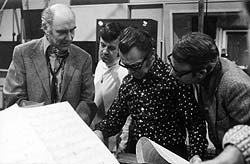A Conversation With Tony Fisher
Tony Fisher is not just the director of the modern Bert
Kaempfert Orchestra, he was also Bert's lead trumpet player for almost a
decade. Few people can have such a deep and intimate knowledge of the man
and his music.
Neville Farmer spoke with him.
Tony: I may be old-fashioned but I really believe that there will always
be an audience for quality music and Bert's music always had that. He was
a perfectionist. As a young man in the sixties I was very aware of Bert's
reputation for the superb recording quality on his records. His music was
just the same.
I've played for some of the best jazz bands in the world and am currently a member of the wonderful Stan Tracey Big Band, but they never have the commercial success because of the limited jazz appeal, and Stan would never compromise on that. But somehow Bert managed to top the charts without ever compromising his standards. He was very clever that way.
The music business is unique in that you can have huge success with some dreadful rubbish and you can fail with wonderful quality music, no matter what style or type. Bert did it marvellously. He succeeded with high quality music and still appealed to just about everyone.
Q: So what was he like?
Tony: You couldn't hope to work for a nicer guy. He was always so patient and happy with what you gave him. He had a double-smooth, unflappable personality. I don't think I ever once saw him get agitated about anything. I've worked with many bandleaders in my time, some of them very famous, some nice, some not so nice, but Bert was like his music - smooth and sophisticated.
Tony: In 1970. Bert was already well established by that time and when someone left the band he would confer with Herb Geller - who was his lead saxophone player for many years - on who to bring in as replacements. Herb and I had worked together previously in the Kenny Clarke - Francy Boland Band and he knew my capabilities so he put my name forward as lead trumpet player. Bert obviously liked what I did since I stayed with him from then until his early tragic death in 1980.
Q: So why did you start the new orchestra?
TF: An agent once said to me, "This is the Rolls-Royce of orchestras" - and he was right. Bert was a perfectionist and I wanted to carry on that tradition. So I called Marion Kaempfert - Bert¹s daughter - and she told me that they had been thinking of putting together a band but didn¹t know who should lead it. Now I have stepped into that slot and she is really happy about the whole thing.
In addition to the Kaempfert Orchestra I am very busy in the session world
- currently playing the "Parkinson" show every week on BBCTV, plus
many recordings and concerts with the likes of Ted Heath, John Dankworth,
The London Symphony Orchestra, and many others. Although I¹ve played
most of my professional years in bands and studios, I did in fact start out
at the
tender age of 14 playing solo trumpet on the variety stage - hence I felt
confident about playing and presenting a show to an audience and thought
if I was going to lead an orchestra, a Bert Kaempfert Orchestra would be
perfect, and this band is the best.
Q: How did you find the band members?
Tony: With spending the last thirty years or so in studios I was always with the cream of British musicians, so that is where I recruited them from and of course I know exactly who can play this sort of music. There are very few young musicians who would understand things like Bert's signature click bass, but Dave Richmond has been a top bassist since his days with Manfred Mann in the sixties and he remembers exactly how to do it. The same goes for the rest of the rhythm section.
It was that sound which gave Bert's records such originality and Harold Fisher is the kind of drummer who knows just how to find the right touch. A lot of modern drummers can play faster and louder than anyone before them, but you need a knowledgeable and experienced head as well and Harold has all those things.
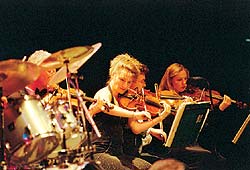 As
far as possible, we are recreating the sound exactly as Bert arranged it
and that takes the kind of musicians you have to fight for. Every now and
then I cannot get exactly who I want because they're all working all the
time, so I have to book them up to six months ahead. Of course, we could
never tour with a full fifty-piece orchestra with the full 24-piece string
As
far as possible, we are recreating the sound exactly as Bert arranged it
and that takes the kind of musicians you have to fight for. Every now and
then I cannot get exactly who I want because they're all working all the
time, so I have to book them up to six months ahead. Of course, we could
never tour with a full fifty-piece orchestra with the full 24-piece string
section as the original band did. But our four strings - led by Godfrey Salmon
- are augmented by our keyboard player, Trevor Brown, on some beautifully
and subtly arranged synthesisers -
that is when I can pry him away from being London Weekend Television's star
Musical Director. He directs all the Barrymore shows, The Royal Command Performances
and many other shows on LWT. If I wanted a totally stable line-up for the
Bert Kaempfert Orchestra, I could get it by finding less busy musicians,
but Bert would only use the best and I won't have it any other way.
Q: How and when did it all start for you?
Tony: This is my fiftieth year in the business so I¹ve seen quite a
lot along the way . I had my first professional job at 14 as I said - doing
a summer season with Jewel and Warriss - a very famous comedy duo in the
1950¹s - and later that year was "discovered" by Caroll Levis
- with whom I
toured alongside such people as Jim Dale, Morecambe and Wise, Barry Took
- all destined to later become household names. From there it was a natural
progression into session work and bands.
I've played on hundreds of hits. I typed my name into an American music website recently and I couldn't believe how many records I was credited on. There are the obvious ones like "Strawberry Fields Forever" for The Beatles and "Delilah" and "It's Not Unusual" for Tom Jones, plus lots for Sandie Shaw, Petula Clark and Dusty Springfield, Engelbert Humperdinck - the list goes on and on. Judd Procter, our guitarist, who I've worked with for forty years or so, also played on many of them. He was a real big-shot in the group recording business in the sixties because most of the kids in the bands couldn't really play. We both played on plenty of hits but there were plenty I'd rather forget. Still, for every few bad sessions I worked on, there would always be a Tony Bennett or Peggy Lee or Frank Sinatra session to do.
Q: What was Frank like to work with?
Tony: When Frank came over for a European tour about ten or fifteen years ago, he brought his own rhythm section but employed the rest of the band from here in London. I was asked to be lead trumpet and, as he was staying in the Savoy Hotel, the first rehearsal was booked there. I set off for the three o'clock session with time to spare but quickly got snarled up in traffic. Every way I turned there was a jam and by the time I got there it was twenty past three and everybody was sitting there in nervous silence. I walked in and those famous blue eyes just burned right through me. I thought, "Oh God! It's the cement waistcoat for me." I said sorry but there was silence. Anyway, we started playing and luckily the first piece had a solo for me and as soon as I started playing a big smile spread across his face and the whole mood of the room changed. Afterwards, the contractor came over and said, "What happened? Nobody's ever late for Frank. Did you see all those heavies with him?" I did and I really thought I was dead.
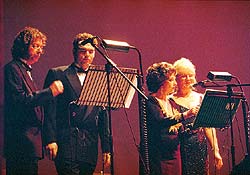 Q: You
have toured with many bands. How does this one compare?
Q: You
have toured with many bands. How does this one compare?
Tony: It can be very hard but also great fun with a few adventures along the way. We often travel on a bus together if it's far from London and we've done a couple of European tours, which have been fantastic. When I organised the first tour my heart was in my mouth because I didn't want things to go wrong.
We started in Utrecht in Holland and the place was packed. The show was
out of sight, so when we finished we all went back to the hotel to celebrate.
Some celebrated more than others and we nearly left a couple of the younger
players behind the next morning. But despite their hangovers, they never
complained and they played fantastically every night. I hope and believe
that I get a little more respect from the band than most bandleaders do because
I play. When the bandleader doesn't play there's often an instant animosity
from the players towards someone they see as a businessman who reads a balance
sheet better than a music score.
Q: How has the European reception been to the new Bert Kaempfert Orchestra?
Tony: Fantastic. We get great audiences in Britain but in Europe people just go wild. It's really strange for an English bandleader with an English band with a German name playing in Germany and getting standing ovations. The people there are very receptive. We even have a regular TV slot there on a Saturday night, a big Gala show produced by NDR-TV in Hamburg, where we accompany international pop and opera singers and play a couple of Bert Kaempfert instrumentals.
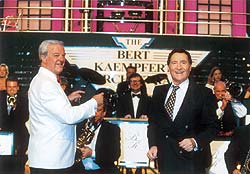 It
all started in 1998 when we recorded a tribute show for Bert and Freddy Quinn
joined us to sing some of the songs he used to do with Bert and myself in
the seventies. Over there, there is a real sense of occasion and it was wonderful
to see Freddy and relive some of that magic. Seeing the Bert Kaempfert Orchestra
playing again is something special in Germany. If we had the same sort of
support from the media in the UK we'd be playing every week to packed venues.
It's no wonder it's so tough for big bands in the UK.
It
all started in 1998 when we recorded a tribute show for Bert and Freddy Quinn
joined us to sing some of the songs he used to do with Bert and myself in
the seventies. Over there, there is a real sense of occasion and it was wonderful
to see Freddy and relive some of that magic. Seeing the Bert Kaempfert Orchestra
playing again is something special in Germany. If we had the same sort of
support from the media in the UK we'd be playing every week to packed venues.
It's no wonder it's so tough for big bands in the UK.
Q: So what kind of show can we look forward to tonight?
Tony: The surprise to a lot of people is how visual a band we are. Our singers, who include the brilliant and hugely experienced Joan Baxter, were really shocked by how busy they would have to be when they started working with the orchestra. Bert's arrangements are quite complex and there's always something happening. That's why the poor spotlight operator never knows whom to focus on. It's a nightmare for him. But the audiences love it.
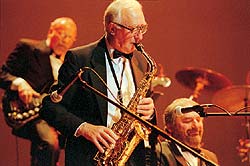 We'll
be playing all Bert's great hits, and we'll also focus on one of his little
known passions, swing. He always wanted a swing band but commercial constraints
stopped that, though of course he did release one swing album. We would talk
at length about how he used to listen illegally to American recordings during
the war, which is where he developed his love for swing music. A lot of people
only associate Bert with string and voice ballads. I think what will surprise
them is that the Bert Kaempfert Orchestra can play swing as well or better
than most of the swing bands on the circuit. Because we have people like
Roy Willox, who still, to this day, plays lead alto with the Ted Heath band,
Cliff Hardie, whose trombone solos graced Sammy Davis Jnr, Ella Fitzgerald
and Bing Crosby records, plus bass trombonist, Bill Geldard, and myself who
have been raised on that kind of music, it really sets the place alight.
We'll
be playing all Bert's great hits, and we'll also focus on one of his little
known passions, swing. He always wanted a swing band but commercial constraints
stopped that, though of course he did release one swing album. We would talk
at length about how he used to listen illegally to American recordings during
the war, which is where he developed his love for swing music. A lot of people
only associate Bert with string and voice ballads. I think what will surprise
them is that the Bert Kaempfert Orchestra can play swing as well or better
than most of the swing bands on the circuit. Because we have people like
Roy Willox, who still, to this day, plays lead alto with the Ted Heath band,
Cliff Hardie, whose trombone solos graced Sammy Davis Jnr, Ella Fitzgerald
and Bing Crosby records, plus bass trombonist, Bill Geldard, and myself who
have been raised on that kind of music, it really sets the place alight.
It's that wealth of experience, the passion for playing and the sheer quality of Bert's music that makes these evenings so special. When we play a new venue, we can hear the sigh of delight coming over the footlights towards us as we play the first four bars of "A Swingin' Safari" and people realise that this really is Bert's music, played exactly the way he wrote and arranged it.
